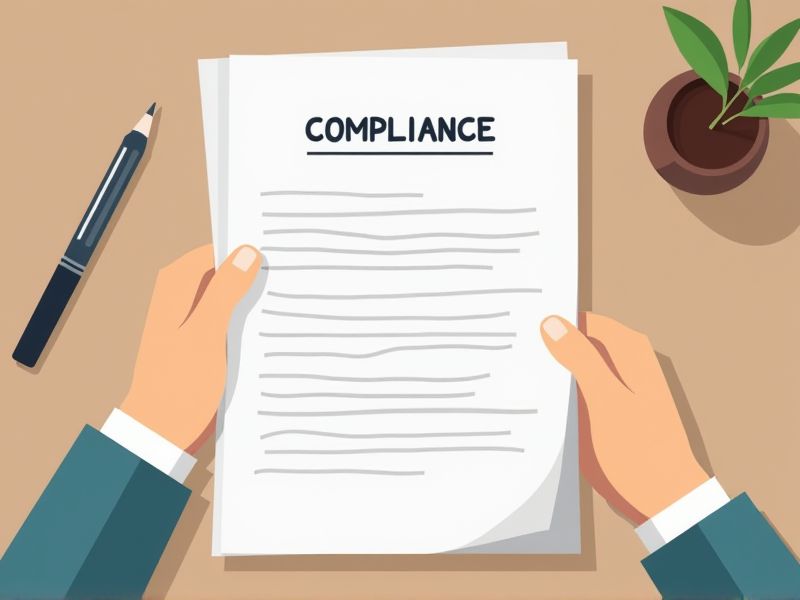
Compliance Specialists must navigate complex regulatory environments, which necessitates a deep understanding of specific industry standards and legal requirements. Certifications provide professionals with the necessary knowledge and skills to identify risks and implement controls effectively. Achieving these credentials signals a commitment to maintaining ethical standards and enhances trust with stakeholders. Some important certifications you may need as a Compliance Specialist are outlined below.
Certified Compliance & Ethics Professional (CCEP)
Prevention of legal risks and penalties increases when Compliance Specialists acquire Certified Compliance & Ethics Professional (CCEP) credentials, as the certification ensures they have advanced knowledge of regulations and ethical practice. Trust and confidence from external stakeholders grow as certified professionals signal a commitment to ethical standards and compliance diligence. Effective enforcement of comprehensive compliance programs happens more consistently when specialists possess CCEP, given its focus on practical application of ethics in business operations. Professional credibility and career advancement improve through CCEP certification, as it demonstrates recognized expertise and dedication within the compliance field.
Certified Regulatory Compliance Manager (CRCM)
The role of a Certified Regulatory Compliance Manager (CRCM) is crucial for a Compliance Specialist because it provides standardized knowledge in navigating complex regulatory environments. Achieving the CRCM credential enhances credibility, therefore, attracting trust from employers and clients who seek assurance in compliance operations. Understanding ever-evolving regulations through CRCM certification results in reducing corporate risks and financial penalties. CRCM-trained Compliance Specialists can efficiently design and implement compliance strategies, improving organizational efficiency and effectiveness.
Certified Information Privacy Professional (CIPP)
A Certified Information Privacy Professional (CIPP) equips a Compliance Specialist with a comprehensive understanding of privacy laws and regulations, critical for navigating complex compliance landscapes. The certification ensures the specialist has the necessary skills to effectively protect personal data, reducing the risk of data breaches and potential legal liabilities. CIPP provides validation of expertise, which increases the credibility of the Compliance Specialist in the eyes of employers and clients. With privacy becoming a top priority for many organizations, CIPP-trained professionals are in high demand to maintain and improve compliance frameworks.
Certified Internal Auditor (CIA)
A Certified Internal Auditor brings a structured approach to evaluating the effectiveness of compliance programs, enhancing an organization's adherence to regulations. Expertise in risk management and internal controls equips the Compliance Specialist to identify vulnerabilities in processes and suggest improvements. Certification demonstrates a deep understanding of auditing standards and best practices, lending credibility in both internal and external audits. As regulatory landscapes become more complex, a CIA's skill set becomes essential for preemptively addressing potential compliance issues.
Certified Fraud Examiner (CFE)
A Certified Fraud Examiner (CFE) enhances the ability of a Compliance Specialist to identify fraudulent activities, which strengthens organizational risk management strategies. By integrating CFE expertise, compliance programs can effectively assess and mitigate compliance risks related to financial misstatements and unethical behavior. The unique CFE training in fraud detection and investigation provides a proactive approach, reducing the likelihood of regulatory violations. As regulatory environments evolve, the specialized knowledge of a CFE ensures compliance programs remain robust and adaptive to emerging challenges.
Certified Information Systems Auditor (CISA)
A Compliance Specialist often deals with regulations related to data security, and a Certified Information Systems Auditor (CISA) provides the expertise needed to effectively evaluate and manage these information systems. As organizations increasingly rely on complex IT systems, a CISA-certified individual can ensure that these systems comply with relevant legal and regulatory requirements. CISA offers skills in identifying vulnerabilities and implementing safeguards, which enhances a Compliance Specialist's ability to protect organizational data. The global recognition of CISA certification also adds credibility, offering assurance to stakeholders that compliance practices meet industry standards.
International Diploma in Compliance (IDC)
The International Diploma in Compliance equips professionals with comprehensive knowledge of global regulatory frameworks, which is essential in navigating complex compliance landscapes. With the rise in international business operations, companies face heightened scrutiny, making IDC crucial for ensuring adherence to varied legal standards. The IDC provides practical tools and insights that help compliance specialists mitigate risks and avoid costly legal penalties. Earning the diploma can also enhance career prospects, as employers increasingly seek qualified individuals who can effectively manage compliance challenges.
Certified Risk and Compliance Management Professional (CRCMP)
Achieving the Certified Risk and Compliance Management Professional (CRCMP) designation equips a compliance specialist with a comprehensive understanding of regulatory frameworks, enabling more effective management of compliance obligations. This certification validates the specialist's expertise in identifying potential risks and implementing strategies to mitigate them. By obtaining the CRCMP, a professional signals commitment to maintaining high industry standards, thus enhancing trust among stakeholders. Increased credibility through CRCMP can lead to better career opportunities and heightened organizational compliance resilience.
Lean Six Sigma Green Belt Certification
With Lean Six Sigma Green Belt Certification, a Compliance Specialist can enhance process efficiency, minimizing errors that could lead to regulatory breaches. The certification provides tools for robust data analysis, enabling more accurate compliance audits. It equips specialists to implement continuous improvement, reducing risks associated with non-compliance. Employers value the certification as it signals a proactive approach to maintaining rigorous compliance standards.
Project Management Professional (PMP)
Compliance Specialists ensure organizations adhere to regulations, and the PMP certification provides critical skills in planning and executing projects within constraints. Effective management of compliance projects often requires cross-departmental coordination, a strength of PMP-certified professionals. The rigorous structure and processes in PMP can help streamline compliance workflows, reducing the risk of regulatory breaches. With a PMP certification, Compliance Specialists gain enhanced credibility and leadership capabilities, driving better alignment with organizational objectives.
Summary
When you obtain certifications as a Compliance Specialist, your credibility and expertise in regulatory standards are enhanced. Employers are more likely to trust your judgment, leading to increased job opportunities and potential career advancements. Certification often results in improved skills, enabling you to handle complex compliance issues more effectively. Consequently, your value to organizations rises, increasing prospects for higher compensation and career stability.
